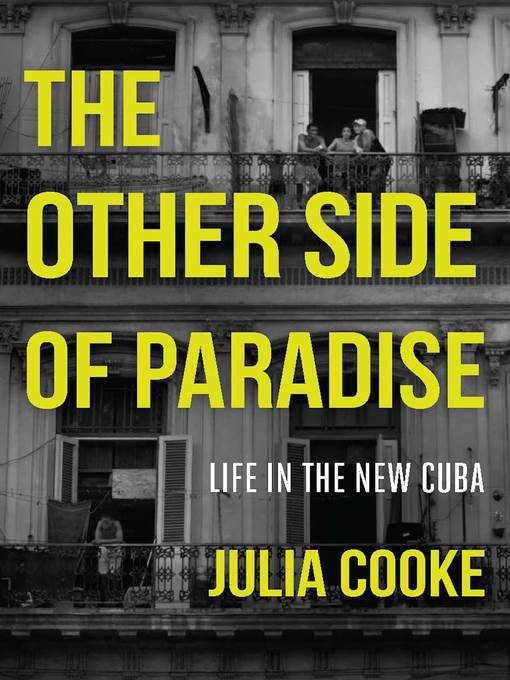
The Other Side of Paradise
Life in the New Cuba
کتاب های مرتبط
- اطلاعات
- نقد و بررسی
- دیدگاه کاربران
نقد و بررسی

February 17, 2014
As journalist Cooke writes in her nonfiction debut, a multilayered collection of vignettes about her time in Cuba: “Havana reveals itself in snippets that build, one atop another, in a constant waterfall of places and scenes.” Bypassing many of the clichéd Cuban experiences, Cooke focuses on the day-to-day lives of Cuba’s young people—a population that, in recent years, has been leaving the country in droves. She quickly discovers that blackouts and service interruptions are as common as raucous street parties, that a box of Canadian corn flakes sells for $12, and that it’s possible to score five mojitos for a dollar, all while learning about the country’s dramatic history. It’s not all gloom and doom: Cuba now has a vibrant gay community, and punk rockers gleefully mix their metaphors. Cooke tries admirably to cover a subject that only seems to expand as she digs deeper, examining Santería, and the ever-present specter of government surveillance and Communism. Unfortunately, the more she digs, the more Cooke finds herself trying to nail down mercury as she shifts from subject to subject, never reaching a definitive conclusion or analysis. As a travelogue, the book is a fine example of the author’s experiences. As an analysis of an incredibly complex and ever-changing culture, it falls short. Agent: Diana Finch, Diana Finch Literary Agency.

February 15, 2014
Following multiple trips to the island--organized by an unnamed friend, the "Communist fairy godfather"--first-time author Cooke (Writing/The New School) chronicles the lives of nine Cubans and their families in the years immediately after Raul Castro replaced his brother as president. "I wanted to collect the stories of today's young Cubans in the fragile pillow of transitional time between Fidel and whatever would come next," writes the author. "I wanted a hint at what their revolution could resemble." Despite diverse backgrounds, families and future goals, the stories of these young Cuban nationals share many similarities: an overwhelming sense of unease, the haze of unrest and the lack of an obvious path toward change. Some of the author's subjects include Lucia, a recent graduate of the University of Havana who was "putting in the two years of social service that 'paid for' the degree"; and Sandra, a prostitute who viewed her plans for the future as "clouds she thought she'd walk into; they'd envelop her and then everything would be different." Not all of them want to leave their homeland, but all struggle with an ever-changing flow of plans for achieving a stable life. The book flows naturally from subject to subject, not chronologically but still organically. Cooke revisits each of her subjects at different times during their lives, which helps to round out the narrative, and the inclusion of their families and friends also adds welcome depth. Though the author does not provide a resolution to each of the stories, despite the multiple visits and a one-year-later denouement, this lack of an ending is mostly a function of the still-changing Cuba. Despite a few meandering, unfocused sections, Cooke introduces a world that somehow makes sense in its lack of reason, as understood by American readers. An excellent taste of Cuba today, without tourist plans or political agenda.
COPYRIGHT(2014) Kirkus Reviews, ALL RIGHTS RESERVED.

Starred review from April 15, 2014
In this debut book, journalist Cooke takes readers on a remarkable trip to present-day Cuba, focusing on life in the country following Fidel Castro's 2008 resignation. Cooke lived in the country for five years, during which she met and interacted with a group of young adults who only knew life under Castro and the revolutionary government. The author's storytelling about Lucia, Carlos, Adrian, and other young Cubans will engage readers in these individuals' daily lives, desires, prospects, and dreams. Their families initially benefited from the communist government's policy changes but subsequent reforms limited their capacity to make any economic gains, and most have at least one family member who has left the country or know somebody who has done so. The narratives discuss the slight economic openings made under current leader Raul Castro, Fidel's brother, but also the remaining cultural limitations and black market for banned literature and music. Cooke provides an insightful look into contemporary Cuban life, interweaving historical events into her writing and enabling readers to understand the challenges facing Cuba's youth and its hopes for a better life either on the island or elsewhere. VERDICT An absorbing and educational read about contemporary Cuba, the love of its people for their country, and their hope for opportunity. Fans of Latin American culture should definitely include this one on their reading list.--Susan E. Montgomery, Rollins Coll., Olin Lib., Winter Park, FL.
Copyright 2014 Library Journal, LLC Used with permission.

March 1, 2014
As the title suggests, this is a rather dreary portrait of post-Fidel Cuba. Cooke is a journalist and teacher at the New School in New York. Her observations are the result of living in Cuba and interacting with a variety of ordinary Cuban citizens over a five-year period. Her account is absorbing, touching, but certainly depressing. As described here, Cuba is a postrevolutionary culture in which the fires of revolution have burned out. So largely gone is the optimism, the spirit of community and self-sacrifice, and the belief in the creation of the new socialist man. What remains, unfortunately, is the political repression, stifling bureaucracy, and material deprivation. Cooke's narrative includes wonderful vignettes covering the daily lives of Cubans in which their hopes, dreams, and frustrations are revealed. Lucia, a well-educated and relatively privileged young woman, sees little future for herself in Cuba and hopes to emigrate. So does Sandra, a street-smart prostitute who refutes government claims to have ended exploitation. But there are snippets of optimism, as citizens bravely and brazenly complain about their government.(Reprinted with permission of Booklist, copyright 2014, American Library Association.)

























دیدگاه کاربران